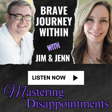
Episode 10: How to Overcome Failure & THRIVE
On this episode Jim and Jenn discuss tried and true steps to overcoming failure and how to adaptively look at failure in ways that can help you move through the experience and THRIVE.
Welcome to the Brave Journey Within with Jim and Jenn! This show is about the spiritual journey and all of the challenges, healing and expansion along the way. Join us as we bravely explore topics of metaphysics, spirituality, healing, mindfulness, and ascension. We will be sharing our experiences and wisdom, as well as diving deeply into various topics so that you can better understand your own journey. Whether you are just starting out or have been on the spiritual path for many years, this show is a space for you to learn, grow, and be inspired.
Also find us on:
Spotify: https://open.spotify.com/show/5uZ610Q1CdewYbVmzu7HId
Apple Podcasts: https://podcasts.apple.com/us/podcast/brave-journey-within-with-jim-jenn/id1719187161
Google Podcasts: https://podcasts.google.com/feed/aHR0cHM6Ly9mZWVkcy56ZW5jYXN0ci5jb20vZi81VkI1UUI4My5yc3M
To learn more about Jenn: https://jenn-palmer.com/
Jenn Palmer YouTube: https://www.youtube.com/@JennPalmerHealer/
To Learn more about Jim and Journey Mindfulness: https://journeymindfulness.com/
Journey Mindfulness YouTube: https://www.youtube.com/channel/UCLu7Bfk-3-ZKmypgRt2OxMw
All information and guidance given on this channel is meant to help empower you and is not to be considered medical or psychological advice. Please seek medical and psychological support as appropriate for your concerns.
#bravejourneywithin #spiritualgrowth #unconditionallove #spiritualjourney #spiritualdevelopment #ascension #mindfulness #karma #forgiveness #divinepower #relationship #failure #success



















